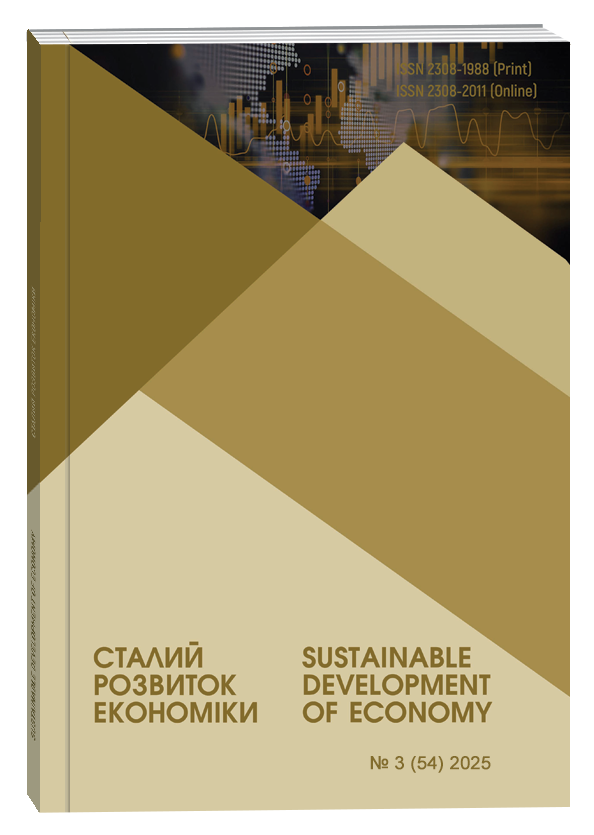IMPACT OF INDUSTRY 4.0 ON THE CHARACTERISTICS OF THE SUPPLY CHAIN MANAGEMENT SYSTEM
Abstract
This study examines the transformative impact of Industry 4.0 (I4.0) technologies on the core characteristics of Supply Chain Management (SCM) systems. Driven by cyber-physical systems (CPS), the Internet of Things (IoT), Big Data analytics, Artificial Intelligence (AI), cloud computing, and robotics, traditional linear and stable SCM models are evolving into hyper-connected, agile, and intelligent networks. The research focuses on the logistical dimensions of SCM: Procurement, Transportation, Warehousing, and Order Fulfillment. For each functional area, critical Key Performance Indicators (KPIs) are identified and justified, serving as quantitative measures of characteristics like speed, accuracy, cost efficiency, flexibility, reliability, and customer-centricity. The core contribution lies in a systematic analysis of how specific I4.0 technologies impact these KPIs within each SCM function. For instance: CPS/IoT enable unprecedented end-to-end visibility and real-time tracking of assets/orders. Big Data & AI facilitate predictive analytics for demand forecasting, route optimization, and proactive issue resolution, enhancing agility and responsiveness. Robotics & Automation (e.g., autonomous guided vehicles, smart warehouses) significantly improve speed and accuracy in warehousing and fulfillment. Additive Manufacturing (3D Printing) influences localization and customization potential, impacting supply chain structure. Cloud Computing & Interoperability Standards (APIs, blockchain) underpin seamless data exchange (interoperability) across the network. Recognizing the limitations of rigid assessment matrices, the study proposes a novel "Descriptive SCM Characteristics Profile" framework. This dynamic framework enables managers to: Identify critical bottlenecks ("weakest" characteristics). Prioritize digital investments based on potential impact on target characteristics/KPIs. Develop actionable roadmaps combining technology implementation (e.g., IoT platforms, AI controllers) with organizational process changes. Track progress through regular KPI measurement against targets. The study concludes that digital transformation, guided by this characteristics-centric approach, is essential for SCM systems to achieve superior customer orientation, optimize costs across the chain, enhance resilience, and maintain competitiveness in the dynamic global market shaped by Industry 4.0.
References
Frederico, G. F., Kumar, V., Garza-Reyes, J. A., Kumar, A., & Agrawal, R. (2023). Impact of I4.0 technologies and their interoperability on Supply Chain Performance: A systematic literature review. The International Journal of Logistics Management, № 34(Vol.2), P. 437-473.
Ivanov, D., Dolgui, A., & Sokolov, B. (Eds.). (2021). Handbook of Ripple Effects in the Supply Chain. Springer.
Kamble, S. S., Gunasekaran, A., & Gawankar, S. A. (2020). Achieving sustainable performance in a data-driven agriculture supply chain: A review for research and applications. International Journal of Production Economics, № 219, P. 179-194.
Luthra, S., & Mangla, S. K. (2023). Evaluating challenges to Industry 4.0 initiatives for supply chain sustainability in emerging economies. Process Safety and Environmental Protection, № 170, P. 1119-1132.
Mastos, T. D., Nizamis, A., Vafeiadis, T., Alexopoulos, N., Ntinas, C., Gkortzis, D., & Tzovaras, D. (2021). Industry 4.0 sustainable supply chains: An application of an IoT enabled scrap metal management solution. Journal of Cleaner Production, № 312, 127654.
Müller, J. M., Buliga, O., & Voigt, K. I. (2021). The role of absorptive capacity and innovation strategy in the design of Industry 4.0 business Models-A comparison between SMEs and large enterprises. International Journal of Production Economics, № 240, 108244.
Queiroz, M. M., Pereira, S. C. F., Telles, R., & Machado, M. C. (2021). Industry 4.0 and digital supply chain capabilities: A framework for understanding digitalisation challenges and opportunities. Benchmarking: An International Journal, № 28(Vol. 5), P. 1761-1782.
Ralston, P., & Blackhurst, J. (2020). Industry 4.0 and resilience in the supply chain: A driver of capability enhancement or capability loss? International Journal of Production Research, № 58(Vol. 16), P. 5006-5019.
Tortorella, G. L., Saurin, T. A., Fogliatto, F. S., Tlapa, D., Moyano-Fuentes, J., Gaiardelli, P., ... & Narayanamurthy, G. (2023). The impact of Industry 4.0 technologies on operational resilience. Production Planning & Control, № 34(Vol. 16), P. 1537-1554.
Winkelhaus, S., & Grosse, E. H. (2023). Logistics 4.0: a systematic review towards a new logistics system. International Journal of Production Research, № 61(Vol. 18), P. 6207-6236.
Zekhnini, K., Cherrafi, A., Bouhaddou, I., Chaouni Benabdellah, A., & Bag, S. (2024). Supply chain management 4.0: a literature review and research framework. Benchmarking: An International Journal, № 31(Vol. 1), P. 211-242.
Zhou, C., Damgaard, C. M., Zhao, M., & Christensen, T. H. (2023). How does digitalization affect the environmental performance of solid waste management? A systematic review. Waste Management, № 169, P. 61-75.
European Commission. (2023). Digitalising the European Economy: Policies for a thriving and inclusive digital transformation. Directorate-General for Communications Networks, Content and Technology.
McKinsey & Company. (2023). The State of Supply Chain Technology: What’s Now, What’s Next, and What’s Needed to Win.


